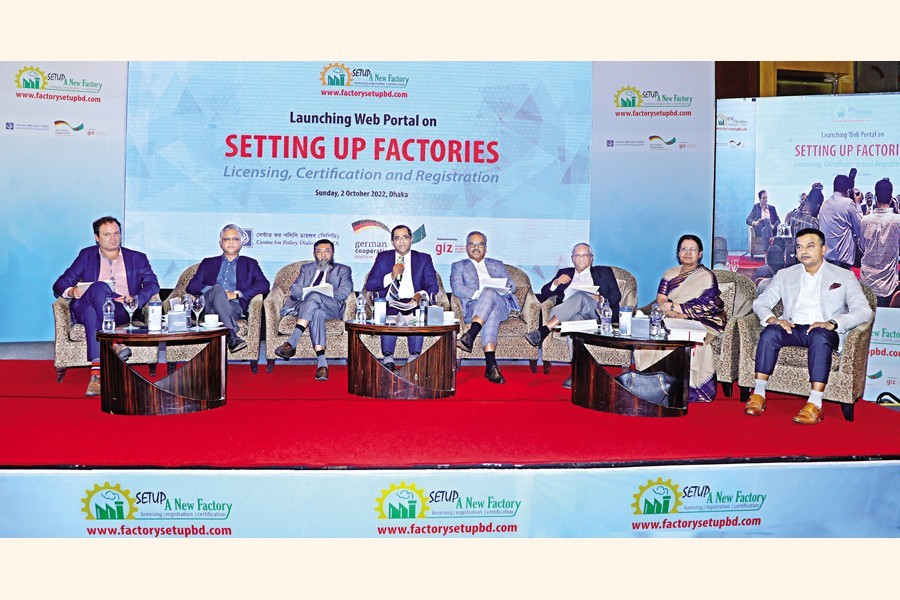
Published :
Updated :

Factory setting-up procedure in Bangladesh is complex, lengthy, and time-consuming for lots of unnecessary paperwork, speakers observed at a discussion Sunday, urging a cleanup.
Entrepreneurs and investors taking part in the discussion noted with dissatisfaction that it is challenging to search necessary information and locate relevant offices to submit the documents to set up factories.
Centre for Policy Dialogue (CPD) and the German international development cooperation agency GIZ jointly organised the discussion titled "Launching Web Portal on Setting up Factories, Licencing, Certification and Registration" at a Dhaka hotel.
The discussion was based on a CPD study on "Setting up a Factory in Bangladesh: Institutional, Operational and Legal Requirements in RMG, Pharmaceutical, Leather, and Food Processing Sector" conducted in collaboration with GIZ.
One of the outcomes of this study is a well-designed web portal (factorysetupbd.com) that is expected to provide industrial enterprises all necessary information and establish a factory without much hassle.
The portal illustrates the process of acquiring permits, licences, certificates, and registration for setting up ready-made garment, pharmaceutical, food- processing and leather-processing factories.
Chairing the session, CPD Research Director Dr Khondaker Golam Moazzem said it is difficult to start a business in Bangladesh because of a lack of information.
"Although the information is available in the government offices, they are not organised, making the process time-consuming and tedious," he adds.
In his introductory remarks, GIZ Project Manager Dr Michael Klode said the project was developed from the perspective of compliance issues, with a significant focus given on the social-environment standards.
Syed Nasim Manzur, President of Leathergoods and Footwear Manufacturers & Exporters Association of Bangladesh (LFMEAB), pointed out several unnecessary steps in the procedure.
He said documents such as drawings and maps on Ammonia sheets and Architects' signature copies can be eliminated to shorten the flowcharts on the website.
"Removing redundant steps will make the process more comprehensive for the business enterprises," he adds.
In her keynote presentation, CPD Research Associate Helen Mashiyat Preoty underscored the need for properly following the information, documents and procedures related to the four respective sectors, and showing how the business enterprises could use the website.
"It is important to ease the process of setting up a factory so that doing business in Bangladesh becomes easier."
Garment suppliers in Bangladesh were facing difficulties in delivering goods to international clothing retailers and brands on time due to extreme load-shedding, BGMEA President Faruque Hassan said.
"The situation has turned so acute that factories are facing four to 10 hours of power outage nowadays," he said.
He also pointed out that the government has enforced the load-shedding to save diesel, but now the factories have to run on diesel due to low-pressure of gas and frequent power outages.
"It is difficult for the foreign organisations to start a business and set up a factory in Bangladesh because most of the information related to these is inaccessible to them," said designated panellist Syed Moazzem Hossain, Director of the Federation of Bangladesh Chambers of Commerce & Industry (FBCCI).
He said most of such information is documented in Bangla.
Since they are not available on one platform, the foreign organisations spend months on licencing, registration and certification before establishing their businesses, he added.
"The government needs to understand that it is not easy for the businessmen to start a business because the expenditures related to gathering information and certification are not feasible," said Abdullah Al Mamun, Vice President of Bangladesh Textile Mills Association (BTMA).
"Although the website will make this process easier, adequate support from the government is still essential," he said.
Mohammad Hatem, Executive President of Bangladesh Knitwear Manufacturers and Exporters Association (BKMEA), said: "A separate checklist for starting a business should be prepared and added to the website."
He said that before setting up a factory, they need to start a business which will require some standard documents. "Keeping a separate checklist for it will help the entrepreneurs understand the process better."
Commenting on the website's structure, Ferdaus Ara Begum, Chief Executive Officer of Business Initiative Leading Development (BUILD), suggested that the flow charts shown on the website should include the intermediaries that the businesses need to collaborate with, and the time frame.
bdsmile@gmail.com


 For all latest news, follow The Financial Express Google News channel.
For all latest news, follow The Financial Express Google News channel.